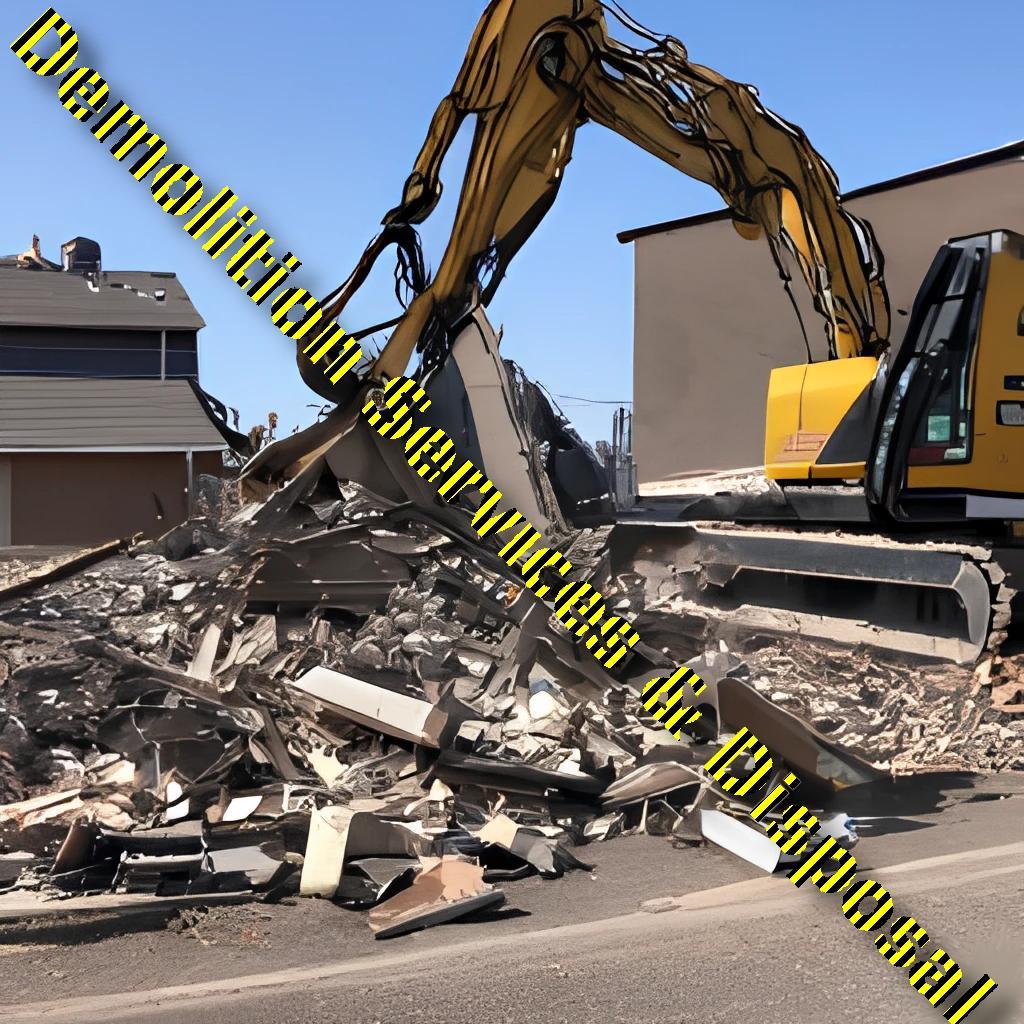








Demolition, though often associated with destruction, is an art form that involves precision, safety, and environmental responsibility. As structures evolve, the need for demolition services arises, accompanied by the crucial task of waste disposal. Here's a guide with useful tips on navigating the world of demolition services and sustainable disposal practices, ensuring that the process is not only efficient but also environmentally conscious.
Choosing the Right Demolition Method: Different structures require different demolition methods. Select the appropriate method based on the type of structure, its size, and its proximity to other buildings. Controlled implosions, mechanical demolition, or selective dismantling are common methods, each with its own set of considerations.
Safety First: Prioritizing Demolition Safety: Before embarking on any demolition project, prioritize safety measures. Ensure that the demolition team is well-trained, follows proper safety protocols, and uses the necessary personal protective equipment (PPE). Conduct thorough site inspections to identify potential hazards and mitigate risks.
Environmental Impact Assessment: Before initiating a demolition project, conduct an environmental impact assessment. Identify any hazardous materials in the structure, such as asbestos or lead-based paint, and implement proper removal and disposal procedures. This not only ensures the safety of workers but also prevents environmental contamination.
Selective Demolition for Salvage: Consider selective demolition to salvage reusable materials. Salvaging items like doors, windows, fixtures, or architectural elements not only reduces waste but also contributes to sustainable building practices. Work with salvage companies to identify valuable materials that can find new life in other construction projects.
Waste Management and Recycling: Develop a comprehensive waste management plan that includes recycling as much debris as possible. Concrete, metal, wood, and other materials can often be recycled, reducing the environmental impact of the demolition process. Collaborate with local recycling facilities to properly dispose of and repurpose materials.
Proper Disposal of Hazardous Materials: Handle hazardous materials with extreme care. Asbestos, lead-based paint, and other toxic substances require specialized disposal methods. Work with licensed professionals to safely remove and dispose of hazardous materials according to regulatory guidelines.
Community Communication and Permits: Before starting a demolition project, communicate with the local community and obtain the necessary permits. Inform neighbors about the project timeline, potential disruptions, and safety measures in place. Obtaining proper permits ensures legal compliance and a smooth demolition process.
Dust and Noise Control: Implement measures to control dust and noise generated during the demolition process. Use water sprays or dust suppressants to minimize airborne particles. Employ noise barriers or schedule demolition activities during permissible hours to mitigate the impact on the surrounding community.
Reuse and Repurpose Materials: Explore opportunities to reuse and repurpose materials on-site. Crushed concrete can be used as fill material, and salvaged wood may find new life in furniture or landscaping projects. Repurposing materials not only reduces waste but also adds a sustainable touch to the post-demolition phase.
Post-Demolition Site Restoration: After the demolition is complete, focus on site restoration. Ensure that the site is properly graded, and any remaining debris is removed. Planting grass or native vegetation can help stabilize the soil and contribute to the ecological restoration of the area.
Demolition services refer to the process of tearing down a structure or building, either partially or completely, to make way for new construction or to clear a site. Demolition services typically involve a combination of heavy machinery, manual labor, and specialized tools to dismantle and remove the structure.
Disposal of the resulting debris and waste is a crucial aspect of the demolition process. Most demolition services providers offer disposal services as part of their package. The debris and waste generated during the demolition process are typically sorted into different categories, including concrete, metal, wood, and hazardous materials. Each category requires a different method of disposal, with hazardous materials requiring special handling and disposal procedures.
Some common disposal methods for demolition waste include:
Recycling: Many materials generated during the demolition process, such as concrete, metal, and wood, can be recycled and repurposed for other construction projects.
Landfill: Some demolition waste, such as non-recyclable materials and hazardous waste, must be disposed of in a landfill. The waste is transported to a landfill site and buried.
Incineration: Hazardous waste generated during the demolition process can be incinerated at specialized facilities.
Donation: In some cases, materials from the demolished structure, such as doors, windows, and fixtures, can be donated to charitable organizations or used for other construction projects.
(!) It is important to work with a reputable demolition services provider who has experience and expertise in the proper handling and disposal of demolition waste. The provider should be able to provide information on their disposal methods and ensure that all waste is disposed of in compliance with local regulations and environmental guidelines.
Here are some additional aspects of demolition services:
Safety: Demolition services can be dangerous due to the use of heavy machinery and the potential for falling debris. Safety measures are paramount, and a reputable demolition services provider should have a comprehensive safety plan that includes protective gear, barriers, and other precautions to prevent accidents.
Permits: Demolition services typically require permits from local government authorities. The provider should be familiar with the permit requirements in your area and obtain the necessary permits before starting work.
Environmental considerations: Demolition can have a significant impact on the environment, including air quality, noise pollution, and waste management. A responsible demolition services provider will take measures to minimize environmental impact, such as controlling dust and noise, and recycling or properly disposing of waste.
Site preparation: Before demolition can begin, the site must be prepared. This may involve removing hazardous materials, disconnecting utilities, and securing the area to prevent unauthorized access.
Salvageable materials: In some cases, materials from the demolished structure may be salvaged and reused. A reputable demolition services provider should be able to identify salvageable materials and take steps to recycle or donate them.
Project timeline: The timeline for a demolition project can vary widely depending on the size and complexity of the structure. A reputable demolition services provider should be able to provide a detailed timeline for the project and work with you to minimize disruption and ensure that the project is completed on time.
Disposal services are a type of waste management service that involves the collection, transportation, and disposal of various types of waste materials. These services can be provided by government agencies, private companies, or non-profit organizations. Here are some aspects of disposal services that are important to know:
Types of waste: Disposal services can handle a wide range of waste materials, including household trash, construction waste, hazardous materials, and medical waste. It's important to choose a disposal service provider that is equipped to handle the specific type of waste you need to dispose of.
Methods of disposal: Disposal services may use a variety of methods to dispose of waste materials, including landfill disposal, incineration, and recycling. The method used will depend on the type of waste and the environmental regulations in your area.
Environmental impact: Disposal services can have a significant impact on the environment, particularly if waste materials are not properly handled and disposed of. A responsible disposal service provider should take measures to minimize environmental impact, such as recycling or properly disposing of hazardous materials.
Costs: Disposal services can vary widely in terms of cost, depending on factors such as the type and amount of waste being disposed of, the location of the disposal site, and the method of disposal. It's important to obtain a detailed cost estimate from the provider before agreeing to their services.
Regulations: Disposal services are subject to local, state, and federal regulations regarding waste management and environmental protection. A reputable disposal service provider should be familiar with these regulations and operate in compliance with them.
Licensing and insurance: Disposal service providers should be licensed and insured to protect both you and your workers in case of accidents or damage to property during the disposal process.
Here are some safety tips to keep in mind during disposal services:
Follow instructions: Always follow the instructions of the disposal service provider or any warning signs posted at the disposal site.
Wear protective gear: If you are disposing of hazardous materials, wear appropriate protective gear such as gloves, goggles, and a respirator to protect yourself from exposure.
Separate materials: Separate different types of waste materials to avoid cross-contamination and to ensure that they are disposed of properly.
Don't overfill containers: Do not overfill waste containers, as this can increase the risk of spills and accidents.
Secure loads: If you are transporting waste materials in your own vehicle, make sure the load is secured properly to prevent spills or accidents during transport.
Dispose of sharps safely: If you have sharps, such as needles or razor blades, use a specially designed sharps container for safe disposal.
Report spills: If you see a spill or accident at the disposal site, report it immediately to the disposal service provider or the appropriate authorities.
Properly dispose of containers: After use, make sure containers are properly disposed of or recycled to avoid harm to the environment.
Here are some safety tips to keep in mind during demolition services:
Follow instructions: Always follow the instructions of the demolition service provider or any warning signs posted at the demolition site.
Wear protective gear: Wear appropriate protective gear such as hard hats, safety glasses, gloves, and steel-toed boots to protect yourself from falling debris or other hazards.
Check for hazards: Before beginning any demolition work, check the area for hazards such as asbestos, lead, or other dangerous materials.
Secure the site: Make sure the demolition site is properly secured to prevent unauthorized access and protect bystanders.
Use proper equipment: Use the appropriate tools and equipment for the job, and make sure they are in good working condition.
Deactivate utilities: Ensure that all utilities such as gas, water, and electricity are properly disconnected before demolition work begins.
Dispose of waste safely: Dispose of waste materials properly and according to regulations to avoid harm to the environment.
Protect nearby structures: Protect nearby structures from damage by using appropriate methods such as shoring or bracing.
Plan escape routes: Plan escape routes in case of emergencies and make sure all workers are aware of them.
Have a safety plan: Develop and implement a comprehensive safety plan that includes procedures for emergencies, communication, and training.
Demolition services, when approached with a commitment to safety, sustainability, and community communication, can be conducted with precision and responsibility. By integrating environmentally conscious practices into the demolition process and embracing sustainable disposal methods, the impact on both the local environment and the broader ecosystem can be minimized. The art of deconstruction lies not only in dismantling structures but in doing so with a mindful approach that considers the present and future well-being of the environment and communities involved.
Sincerely yours,
We use cookies
We use cookies and other tracking technologies to improve your browsing experience on our website, to show you personalized content and targeted ads, to analyze our website traffic, and to understand where our visitors are coming from. Privacy Policy.
